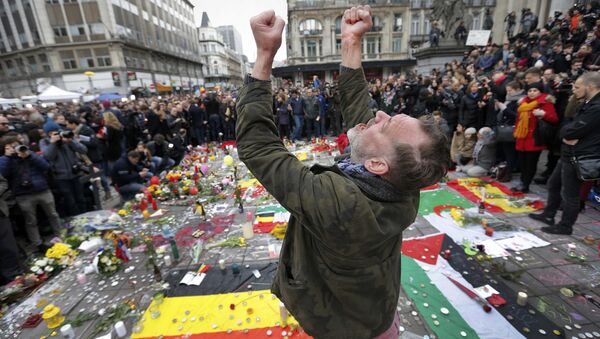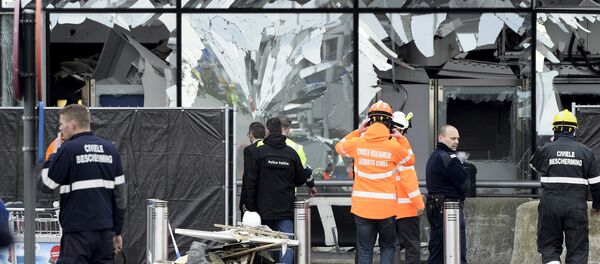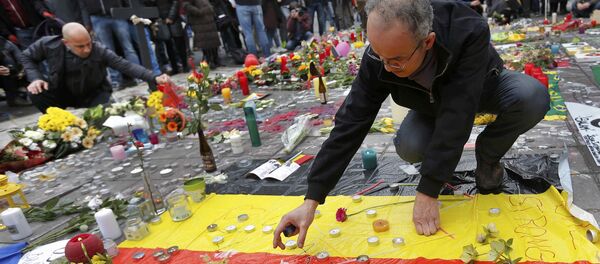And not just Europe, but in many other countries which have suffered much more terrorist violence and for longer, carried out by the very same terror groups.
Europe is in shock and grieving, so emotions are understandably to the fore. This week more than 30 people were killed in terrorist attacks on the Belgian capital, Brussels. The city is also considered to be Europe's political capital, due to it being the headquarters for the European Union administration. With more than 270 persons injured, the death toll could rise in the coming days.
The horror follows an even bigger carnage on the streets of Paris only four months ago, when 130 people were shot to death or blown to pieces by suicide bombers who ran amok in the center of the French capital on November 13.
Both atrocities have been claimed by the Daesh terror group, whose stronghold is in remote parts of Syria and Iraq. Although, in the two European attacks, most of the terrorists involved are known to have been born in Belgium — albeit of Arab national heritage.
There is, however, a cloying tendency in Europe's public response over its latest terrorist victims which appears to be an indulgent, egocentric mourning that is bereft of any bigger cognizant picture.
By that we mean that Europe somehow thinks itself unique in suffering this violence as if it is a vile visitation levied on its streets for no rhyme or reason.
The trouble with much of the reaction to this week's terror attack in Brussels is that it seems solely on the level of raw emotion, with scant reasoning or analysis about how this terrorism is instigated at its roots. By who and why?
Holding vigils, shedding tears and vaguely demanding "an end to terrorism" is all very well. So are calls for "solidarity" between European countries.
Terrorist violence may be mindless in its indiscriminate brutality towards innocent civilians. But terrorism is often not mindless in how it originates as a cultural phenomenon. There are specific political causes, protagonists, financing networks and weapons routes that need to be addressed.
As with the earlier Paris attacks, large crowds of people have this week taken to the center of Brussels to hold vigils and memorials for the victims. But the public discourse is still on a solely emotional level.
Landmark buildings have been lit up at night with the black-yellow-red tricolor of Belgium's national flag. The Eiffel Tower, Brandenburg Gate and Trevi Fountain are among the famous monuments showing illuminated solidarity.
But where are the searching public questions illuminating how or why this terrorist upsurge is happening?
Political leaders have voiced sympathy and solidarity with Belgium. European Commission President Jean-Claude Juncker called for a "union of security", while French President Francois Hollande said the massacre in Brussels was "an attack on the whole of Europe".
These are just empty platitudes being articulated by political leaders, seemingly couched in "solidarity".
Other political figures are clamoring for more military operations against Daesh terror bases in Syria and Iraq, as well as much greater police powers within European countries.
Frankly, the official political reactions across Europe are contemptible. They are an unconscionable distraction from the guilty parties that have fueled Europe's growing terrorist scourge.
Listening to French and British leaders in particular talking about "fighting terrorism" and sympathy for victims is stomach-turning.
This is because France, Britain and the European Union as a whole have played a nefarious role in creating the very terrorism that is rebounding on European civilians.
French President Hollande is on public record admitting that his country sent weapons into Syria as early as 2012 for the purpose of arming militants to overthrow the Syrian government.
Britain likewise covertly supported the same militants in Syria, along with the United States, Saudi Arabia, Qatar and Turkey. The risible cover-story of aiding "moderate rebels" does not stand up to scrutiny. The fact is that extremists like Daesh became weaponized by Western powers in collusion with their regional client regimes.
By slavishly supporting illegal US-led aggression in Iraq, Afghanistan, Somalia and Libya, the European governments have also added more grist to the mill that churns out al Qaeda, Daesh and other related terror groups.
French military assaults in Mali, in reaction to the earlier French-NATO mess unleashed in Libya, has further inflamed Daesh affiliated terror groups in North Africa, the Sahel and across the Maghreb.
The causal links between European foreign interventions and the rise of terrorism across the Middle East are well-documented.
Russia's foreign ministry was entirely correct this week to point out that the terrorism facing Europe is in many ways a problem of its own creation, from playing geopolitical games and pursuing regime change in other countries.
The Syrian government also made the same point. President Assad accused Europe of "exporting terrorism" to the Middle East, which is now exporting it back to Europe.
Notably, both Russia and Syria prefaced their remarks by expressing condolences for European victims of terrorism.
Yet some Western media outlets, such as US government-owned Radio Free Europe, accused Russia of unseemly point-scoring by merely stating the facts of European state complicity in engendering terrorism.
This is the very moment when it is appropriate to speak the truth. The terror that is haunting Europe has not come out of nowhere, as vacuous Western media coverage would have us believe.
The problem with Europe's egocentric mourning is that it fails to discuss and attribute deep causes to terrorism; it lets those governments which are culpable for the violent manifestation off the hook. Not only that but a superficial outpouring of emotion allows guilty governments to then spout empty platitudes about "fighting terrorism" — thus compounding the problem even further.
More than grieving, European citizens need to get a grip and hold their governments accountable for not just Europeans suffering terrorism but for suffering under the same terrorism in many other countries as well.
Maybe when the Eiffel Tower displays the national colors of Afghanistan, Iraq, Syria, Palestine, Mali, Yemen, or other unfortunate victims of terrorism, especially state-sponsored terrorism, then the grieving process might acquire a more constructive purpose.
The views expressed in this article are solely those of the author and do notnecessarily reflect the official position of Sputnik.








